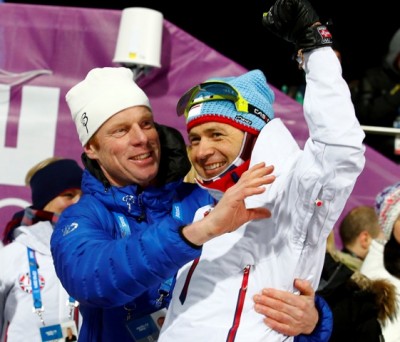Norway’s Olympic champion Ole Einar Bjørndalen has been voted into the athletes’ group of the much-criticized International Olympic Committee (IOC). It’s been widely speculated for months that Bjørndalen would become an IOC member, and he may now be called on to help reform the embattled organization.

Norway’s athletics federation (Norges Idrettsforbund) announced in a press release on Thursday that Bjørndalen won 1,087 votes and will join the IOC along with ice hockey player Hayley Wickenheiser, who won 758 votes. There were a total of nine candidates for the two spots, with a record 81 percent of Olympic participants casting ballots during the Winter Games now playing out in Sochi, Russia.
That means Bjørndalen, a veteran biathlon star who on Wednesday was hailed as the greatest winter Olympian of all time after winning his eighth gold medal since 1998, will formally become a member of the IOC during the closing ceremonies on Sunday. The 40-year-old Bjørndalen, who has said he planned to retire from active sport after the current Olympics, and Wickenheiser will have four-year terms that can be renewed for another four years.
Ready with new goals
Bjørndalen told newspaper Aftenposten earlier this month that he had clear goals if he won a spot on the IOC. They included efforts to further develop biathlon and cross-country skiing, not least in terms of media coverage, and to work for better drug-testing among athletes. “We must not lose faith in clean sports,” Bjørndalen said.
He also said it was important that the IOC listens to its athletes’ representatives. “Without the athletes, the Olympics aren’t worth much,” Bjørndalen told Aftenposten.
Bjørndalen enjoys widespread respect among other athletes, also outside biathlon circles, and has been considered a favourite of other sports officials and even Russian President Vladimir Putin. Newspaper Dagsavisen reported recently that he was the only non-Russian invited by Putin to attend a meeting about the Sochi Olympics even before they were announced, back in 2007, at Putin’s residence in Moscow. Putin was impressed with Bjørndalen’s performance in Salt Lake City in 2002, when he won four gold medals, and sought his advice on the Sochi project.
Bjørndalen claimed he didn’t know enough about how the Russians ended up organizing the Sochi Olympics to comment on criticism that they damaged the local environment and exploited resources. He did say, though, that he thinks the Olympics have become so big, with such demands for security, that ordinary sports fans and spectators don’t get to come and watch them. “That’s a growing trend I’ve seen since the Olympics in Lillehammer in 1994,” Bjørndalen told Dagsavisen. Other commentators have long suggested that the Olympics have outgrown their mission, and evolved into wildly expensive terrorist targets. There’s also been a visible lack of spectators at many events in Sochi.
Making demands of the IOC
Now Bjørndalen presumably will have a voice in such matters. The IOC itself has been the target of both harsh criticism and ridicule for many years, especially during the past few weeks as the Winter Olympics in Sochi grabbed international media attention. The IOC has been accused of being elitist, secretive, demanding, out of touch with both athletes and public sentiment, and mostly for allowing both the Winter and Summer Games to become so huge and costly that few countries are willing to take on the risk of hosting them anymore. Switzerland, Germany, Sweden and Austria are among winter sports nations that recently have dropped out of bidding to be future hosts, because of the costs involved.
Sports bureaucrats and city politicians in Oslo have continued to mount an effort to host what they claim will be a more modest Winter Olympics in 2022, but they lack popular support both in Oslo and nationwide. It remains unclear whether the state government will put up the necessary financial guarantees demanded by the IOC, and more political controversy broke out in Norway on Thursday over the IOC’s demands.
Martin Henriksen, a Member of the Norwegian Parliament for the Labour Party, wrote in a column in Dagsavisen this week that he thinks the IOC must be forced to change its ways. “It’s naive to think you can change the IOC just by arranging an Olympics in Norway,” Henriksen wrote. But Norway is a “superpower” within winter sports and should use its position, he said, to do more than to “bow to an IOC that’s about to abandon its Olympic ideals,” because it fails to impose cost controls, makes only weak demands to organizers to respect basic human rights and turns away from confrontations with immorality.
Norwegian officials and athletes, Henriksen argued, must make demands of their own to the IOC. Bjørndalen will now be among them.
newsinenglish.no/Nina Berglund

